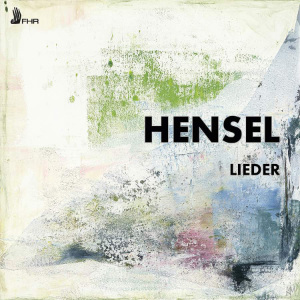
Fanny Mendelssohn-Hensel (1805-1847)
Lieder
Tim Parker-Langston (tenor), Jennifer Parker (mezzo-soprano), Stephanie Wake-Edwards (mezzo-soprano)
Genevieve Ellis, Jâms Coleman, Ewan Gilford (piano)
rec. 2023, Mendelssohn-Haus, Leipzig, Germany
Sung text in German with English translations
Reviewed as download from press preview
First Hand Records FHR148 [83]
The young Fanny Mendelssohn had a solid education in piano and composition; she composed assiduously all her life and left behind more than 450 pieces of music, among them a piano trio and a piano quartet, an orchestral overture and four cantatas, but the majority of her oeuvre consisted of piano music (more than 150 pieces) and Lieder (more than 250). The chamber music works have been recorded, some of her piano works as well – including her suite Das Jahr from 1842) – and a number of her songs. I have reviewed two issues (review ~ review) and in both cases there are follow-ups that I haven’t heard. Since there is very little overlapping between the two sets mentioned, there are quite a few songs available, but there are still many songs unrecorded. Thus the present disc is a welcome addition, as it contains no less than seventeen première recordings. The 34 songs on this extremely well-filled disc are presented in strictly chronological order, so we can follow her development from her early teens until the year before her demise from a stroke, aged 41.
Her earliest attempt was a joint effort by her and her brother Felix, written for the birthday of their father on 11 December 1819. It is the first number on the second of the discs mentioned above. She was fourteen and little Felix was still only nine. It is a touching homage from two infant prodigies, well worth searching out, but only the following year she penned on her own the first three songs on the present disc, and Die Schönheit nicht, o Mädchen certainly points forward to greater things. Three years later, she created the simple and lovely strophic Die sanften Tage and the dramatic Der Sänger, both widening her range of expressivity.
When we reach the year 1827, one of her most prolific years when it comes to song writing, we meet the mature composer; inspired by Ludwig Hölty (tracks 12 – 17), she created the first really great songs. It is worth noting that there are no fewer than five songs titled Sehnsucht written within a couple of years, but they are set to five different poems as well. The last of them (track 21) is possibly the best, and the songs that followed during the 1830s and early 1840s are invariably from her top drawer (tracks 22 – 34). Among the earlier songs, there are several written to poems by rather obscure poets, even though Novalis and Goethe are also represented. In later years, she also turned to Goethe – the well-known Über allen Gipfeln ist Ruh is very beautiful – and Heine, who also inspired her to great things (track 25 – 27). Interestingly, she also set a couple of poems by her husband Wilhelm Hensel (track 28 and 33). He was a prominent artist and even became court painter in Berlin, but reportedly he was totally unmusical – and whether he was much of a poet is a moot point.
The programme was recorded on 3 – 8 January 2023 in the Garden Room in the Mendelssohn-Haus Museum in Leipzig, where Hensel stayed. It was produced by Tim Parker-Langston and David Jones. Parker-Langston also made the English translations of the sung texts and was responsible for the artwork in the booklet. That workload should in all likelihood have already been more than enough, but he certainly went all-out in this production and sings 21 of the 34 songs, too – and very well. He has a light lyric tenor voice which he employs with elegance and feeling, taking great care over nuances. In particular, his soft singing is attractive. In the more dramatic songs his tone hardens and there is more than a trace of strain, but by and large this is attractive singing. His female colleagues, mezzo-sopranos Stephanie Wake-Edwards and Jennifer Parker, are not quite on the same level, but they also are considerate over nuances. The three accompanists also fulfil their tasks convincingly. The album cover artwork is created specifically for this production by Kirsty Matheson. Note that on the cover and in the notes the composer is named only as Hensel, probably to stress her individuality without references to her famous brother.
With seventeen never-before-recorded songs, this issue is a valuable addition to the growing discography of Fanny Hensel.
Göran Forsling
Help us financially by purchasing from


Contents
1820:
1. Wenn ich ihn nur habe *
2. Die Schönheit nicht, o Mädchen *
3. Wohl deinem Liebling *
1823:
4. Der Abendstern †
5. Die sanften Tage *
6. Der Sänger *
7. An die Entfernte
1824–26:
8. Auf der Wanderung *
9. Abschied *
10. Mond*
11 Sehnsucht [H-U 190]
1827:
12 Sehnsucht [H-U 192] *
13 Maigesang
14 Seufzer *
15 An den Mond*
16 An die Ruhe *
17 Sehnsucht [H-U 203] *
18 Sehnsucht [H-U 205] *
19. Umsonst *
20. Suleika
1828–33:
21. Sehnsucht [H-U 217]
22. Nacht
23. In der Ferne *
1835–38:
24. Über allen Gipfeln ist Ruh’
25. Ach, die Augen sind es wieder
26. Das Meer Erglänzte
27. Ich wandelte unter den Bäumen
1840-44:
28. Der Fürst vom Berge
29. Traurige Wege
30. Dämmrung senkte sich von oben
31. Traum
32. Mutter, o sing mich zur Ruh’ *
1846:
33. Erwache Knab’, erwache *
34. Vorwurf
* Première recording † Première commercial recording


















